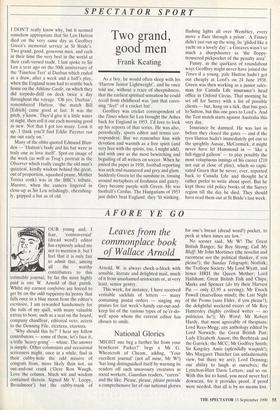SPECTATOR SPORT
Two grand, good men
Frank Keating
I DON'T really know why, but it seemed somehow appropriate that Sir Len Hutton died on the very same day as Geoffrey Green's memorial service at St Bride's. Two grand, good, generous men, and each in their time the very best in the world at their craft-versed trade. I last spoke to Sir Len a year ago on the 50th anniversary of the 'Timeless Test' at Durban which ended as a draw, after a week and a half s play, when the England team had to scuttle back home on the Athlone Castle, on which they did torpedo-drill on deck twice a day throughout the voyage. 'Oh yes, Durban', remembered Hutton, 'the match Bill [Edrich] came good at last. It was the pitch, y'know. They'd give it a little water at night, then roll it out each morning good as new. Not that I got too many. Look it up, I think you'll find Eddie Paynter ran me out early on.'
Many of the obits quoted Edmund Blun- den — 'Hutton's body and his bat were as truly one as love itself'. Spot-on image of the week (as well as Trog's portrait in the Observer which really caught the old man's quizzical, kindly wisdom behind the great, out of proportion, squashed prune, Mother Teresa conk) was in the BBC's tribute, Maestro, when the camera lingered in close-up as Sir Len relishingly, cherishing- ly, gripped a bat as of old.
As a boy, he would often sleep with his 'Harrow Junior Lightweight', and he once told me, without a trace of sheepishness, that the earliest spiritual sensation he could recall from childhood was 'just that cares- sing "feel" of a cricket bat'.
Geoffrey was cricket correspondent of the Times when Sir Len brought the Ashes back for England in 1953. I'd love to look up his reports of that series. He was also, periodically, sports editor and tennis cor- respondent. But we remember him with devotion and warmth as a free spirit (and very free with the spirits, too, I might add), and with awe as the most bewitching and beguiling of all writers on soccer. When he joined the paper in 1938, football reporting was arch and mannered and grey and glum. Suddenly Green let the sunshine in, tossing around metaphors of freshness and gaiety. Grey became purple with Green. He was football's Cardus. The Hungarians of 1953 just didn't beat England, they 'lit winking,
flashing lights all over Wembley, every move a flare through a prism'. A Finney didn't just run up the wing, he 'glided like a yacht on a lovely day'; a Greaves wasn't so much a sharpshooter as 'the floppy- trousered pickpocket of the penalty area'.
Funny, in the quirkiest of roundabout ways Geoffrey might never have joined the Times if a young, pale Hutton hadn't got out cheaply at Lord's on 24 June 1938. Green was then working as a junior sales- man for Canada Life insurance's head office in Oxford Circus. That morning he set off for Surrey with a list of possible clients — but, hang on a tick, that bus goes to Sutton, but this one goes to Lord's. And the Test match starts against Australia this very day.
Insurance be damned. He was last in before they closed the gates — and if the tyro Hutton hadn't immediately got out to the sprightly Aussie, McCormick, it might never have let Hammond in — 'like a full-rigged galleon' — to play possibly the most voluptuous innings of his career (210 not out at close of play), which so capti- vated Green that he never, ever, reported back to Canada Life and thought he'd 'rather prefer to write about sport. But he kept those old policy books of the Surrey region till the day he died. They should have read them out at St Bride's last week.


























































 Previous page
Previous page